For some, this is a relatively easy question to answer: an education.
Those who understand the history, vision and mission of our School would go further and answer: a Christian Education. In my parent interviews, I hear many responses to that question of expectation, a reminder that each of our children is unique.
What should education look like, what should a school provide, and how should the individual needs of my child be met? For some, schools should provide an increasing range of ‘educations’ that cover seemingly every conceivable aspect of life and the latest societal issues thrown in for good measure. At times, it can feel as though schools have become a one-stop ‘shop’, a place to deal with all of those curly issues that we struggle to address as a family or society.
Last year, our parents completed a Community Health Audit survey. It was encouraging to read what they looked for and valued when choosing Calvin as the school for their children. They talked about:
“What should education look like, what should a school provide, and how should the individual needs of my child be met? ”
Positive and strong friendships
Christian values
Strong academic outcomes
Growth in faith
Christian worldview throughout their schooling
Prepared for further/higher education
When our parents were asked to list Calvin Christian School’s strengths, they wrote of: caring teachers, high academic standards, holistic Christian Education, individual care for students, and a close community feel amongst other elements.
“In contrast to an approach that focusses everything at the school level, the founding vision of our School was one of parents and school working in partnership in the nurture of our students.”
In contrast to an approach that focusses everything at the school level, the founding vision of our School was one of parents and school working in partnership in the nurture of our students. This was to be done through a distinctively Christian framework and learning environment. This has the effect of placing our expectations on a solid foundation. Rather than a consumer-driven approach to education, this model offers a far more holistic understanding of the broader educational process in children’s lives and the influences on them. The parent teacher interviews which are happening next week are an important part of this education partnership. You can check our school calendar for details.
As I have highlighted before, this year, we celebrate 60 years of that founding vision in action. Over time we want to share more of this story as we clearly communicate who we are as a school community. If you would like to read more, visit our 60 Year Anniversary web page. This term we have some great opportunities to celebrate our School and our community including on 27 May for a Family Night of Lights and Fireworks and at our 60 Year Anniversary production of Clue on 3 and 4 June. I look forward to seeing you there.
Scott Ambrose — Principal




